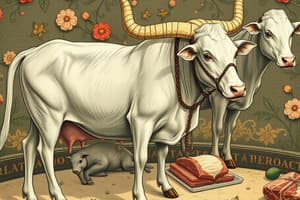Podcast
Questions and Answers
¿Cuál de las siguientes opciones NO influye en el temperamento del animal?
¿Cuál de las siguientes opciones NO influye en el temperamento del animal?
- Condiciones climáticas (correct)
- Frecuencia de contacto con humanos
- Sexo
- Raza
¿Qué factor puede afectar la calidad del temperamento en un animal?
¿Qué factor puede afectar la calidad del temperamento en un animal?
- Número de patas
- Edad (correct)
- Cantidad de comida diaria
- Color del pelaje
¿Cómo influye la frecuencia de contacto con humanos en el temperamento del animal?
¿Cómo influye la frecuencia de contacto con humanos en el temperamento del animal?
- No tiene impacto
- Mejora la sociabilidad (correct)
- Reduce el tiempo de actividad
- Aumenta la agresividad
¿Qué combinación de factores NO se menciona como influyente en el temperamento del animal?
¿Qué combinación de factores NO se menciona como influyente en el temperamento del animal?
¿Por qué es importante la calidad de los contactos en el temperamento del animal?
¿Por qué es importante la calidad de los contactos en el temperamento del animal?
Flashcards
Temperamento animal
Temperamento animal
La forma en que un animal reacciona y se comporta.
Influencias en el temperamento
Influencias en el temperamento
Factores que condicionan el temperamento de un animal (raza, sexo, edad, contacto con humanos y calidad de los contactos).
Raza animal
Raza animal
Categoría de animales con características similares heredadas.
Sexo animal
Sexo animal
Signup and view all the flashcards
Edad animal
Edad animal
Signup and view all the flashcards
Study Notes
Temperament Factors in Animals
-
Animal temperament is influenced by several key factors.
-
Breed: Different breeds exhibit diverse temperaments. For instance, some breeds are naturally more docile, while others are more energetic or prone to guarding behaviours. Breed-specific characteristics play a significant role in shaping an animal's behavioural tendencies.
-
Sex: Male and female animals often display varying temperaments. Biological differences can contribute to variations in aggression, playfulness, and social interactions.
-
Age: Temperament can change dramatically throughout an animal's life. Juveniles often exhibit higher levels of curiosity and playfulness, while older animals may be more reserved or less tolerant of new experiences. Age-related changes in behaviour and temperament are often related to maturity and experience.
-
Frequency of Human Contact: The regularity of interactions with humans impacts an animal's temperament. Animals raised with frequent human contact tend to be more habituated to people and often show more confidence and sociability. Conversely, animals with limited human exposure may be more fearful or wary.
-
Quality of Human Contact: The nature of human interactions influences an animal's temperament. Positive, consistent, and respectful interactions foster trust and reduce fear. Unpredictable, harsh, or frightening human interactions can lead to anxiety, fearfulness, and aggression. The overall quality and consistency of human interaction are key elements in shaping an animal's temperament.
Studying That Suits You
Use AI to generate personalized quizzes and flashcards to suit your learning preferences.




